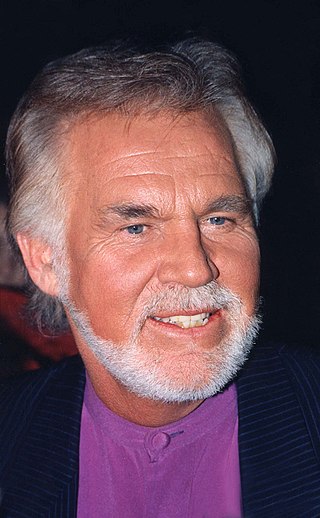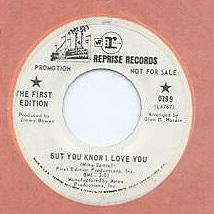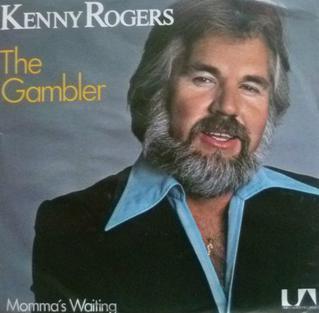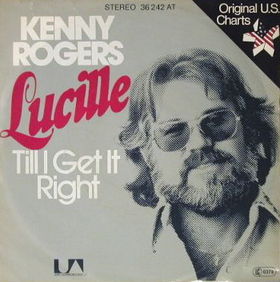
Kenneth Ray Rogers was an American singer and songwriter. He was inducted into the Country Music Hall of Fame in 2013. Rogers was particularly popular with country audiences but also charted more than 120 hit singles across various genres, topping the country and pop album charts for more than 200 individual weeks in the United States alone. He sold more than 100 million records worldwide during his lifetime, making him one of the best-selling music artists of all time. His fame and career spanned multiple genres: jazz, folk, pop, rock, and country. He remade his career and was one of the most successful cross-over artists of all time.

"Islands in the Stream" is a song written by the Bee Gees and recorded by American country music artists Kenny Rogers and Dolly Parton. It was released in August 1983 as the first single from Rogers's fifteenth studio album Eyes That See in the Dark. The Bee Gees released a live version in 1998 and a studio version in 2001.

"But You Know I Love You" is a song written by Mike Settle, which was a 1969 pop hit for Kenny Rogers and The First Edition, a group that included Settle and Kenny Rogers. The song also became a major country hit by Bill Anderson in 1969. In 1981, a cover version of "But You Know I Love You" by singer Dolly Parton topped the country singles charts.

"You Don't Know Me" is a song written by Eddy Arnold and Cindy Walker in 1955. "You Don't Know Me" was first recorded by Arnold that year and released as a single on April 21, 1956, on RCA Victor. The best-selling version of the song is by Ray Charles, who took it to number 2 on the Billboard Hot 100 chart in 1962, after releasing the song on his number 1 album Modern Sounds in Country and Western Music. The first version of the song to make the Billboard charts was by Jerry Vale in 1956, peaking at number 14 on the pop chart. Arnold's version charted two months later, released as an RCA Victor single, 47–6502, backed with "The Rockin' Mockin' Bird", which reached number 10 on the Billboard country chart. Cash Box magazine, which combined all best-selling versions at one position, included a version by Carmen McRae that never appeared in the Billboard Top 100 Sides listing.

"Coward of the County" is a song written by Roger Bowling and Billy Edd Wheeler and recorded by American country music singer Kenny Rogers. The song was released in November 1979 as the second and final single from Rogers' multi-platinum album Kenny. It became a major crossover hit, topping the Billboard Country chart and reaching number three on the Hot 100 chart; it also topped the Cash Box singles chart and was a Top 10 hit in numerous other countries worldwide, topping the chart in Canada, the UK and Ireland, where it remained at number one for six consecutive weeks.

"The Gambler" is a song written by Don Schlitz and recorded by several artists, most famously by American country singer Kenny Rogers.

"She Believes in Me" is a song recorded by American country music singer Kenny Rogers. It was released in April 1979 as the second single from his 1978 album The Gambler. The song was written by American singer-songwriter Steve Gibb who first released his version as a 7" single in 1978. A version by T. G. Sheppard appears on his 1978 album Daylight, released a month before Rogers' album.

"Lucille" is a song written by Roger Bowling and Hal Bynum, and recorded by American country music artist Kenny Rogers. It was released in January 1977 as the second and final single from the album Kenny Rogers. It became Rogers' first major hit as a solo artist after leaving the successful country/rock group the First Edition the previous year. An international hit, it reached number one on the Billboard Country Singles chart and number 5 on the Billboard Hot 100. Overseas, "Lucille" reached the top of the UK Singles Chart in June 1977, the first of Rogers' two number one singles there.

"Love or Something Like It" is a song co-written and recorded by American country music artist Kenny Rogers. It was released in May 1978 as the first single and title track from the album Love or Something Like It. The song was written by Rogers and Steven Glassmeyer and was Kenny Rogers's third number one on the country chart. The single stayed at number one for one week and spent a total of ten weeks on the country chart.

"Through the Years" is a song written by Steve Dorff and Marty Panzer, and recorded by American country music artist Kenny Rogers. It was released in December 1981 as the fourth and final single from the album Share Your Love.

"Who You'd Be Today" is a song written by Aimee Mayo and Bill Luther and recorded by American country music singer Kenny Chesney. It was released in September 2005 as the first single from Chesney's 2005 album The Road and the Radio. It was also Chesney's highest-debuting single at the time, having entered the U.S. Billboard Hot Country Songs chart at number 26. This record has since been broken by "Don't Blink", which debuted at number 16 two years later.

"The Good Stuff" is a song written by Jim Collins and Craig Wiseman and recorded by the American country music artist Kenny Chesney. It was released in May 2002 as the second single from his 2002 album No Shoes, No Shirt, No Problems.

"Somebody" is a country music song written by Dave Berg, Sam Tate, and Annie Tate. The song was originally recorded by American country music artist Mark Wills for his fourth studio album Loving Every Minute (2001). The song was later recorded by Reba McEntire as the second single from her 25th studio album Room to Breathe (2003) on December 22, 2003. The song was released rather quickly due to the underperformance of the album's lead single "I'm Gonna Take That Mountain", which had only reached number 14 on the country charts.

"I Don't Need You" is a song written by Rick Christian, and was first recorded and released as a single in 1978 on Mercury Records, by Rick Christian himself at Shoe Productions, a recording studio/production company in Memphis, Tennessee, but it failed to chart.

"Heads Carolina, Tails California" is a song written by Tim Nichols and Mark D. Sanders and recorded by American country music artist Jo Dee Messina. The song was released in January 1996 as her debut single and served as the lead-off single for her self-titled debut album. The song reached the Top 10 on both the U.S. and Canadian country charts.
"Ol' Red" is a song written by James "Bo" Bohon, Don Goodman, and Mark Sherrill. The song was originally recorded by George Jones on his 1990 album You Oughta Be Here with Me and covered by Kenny Rogers on his 1993 album If Only My Heart Had a Voice. Rogers' version was released as a single in August 1993. It was later recorded by Blake Shelton, and his version of the song was released in March 2002 as the third and final single from his self-titled debut album. Shelton's rendition was also a Top 20 hit on the US Billboard Hot Country Songs chart, having peaked at number 14.

"Big Green Tractor" is a song written by Jim Collins and David Lee Murphy and recorded by American country music artist Jason Aldean. It was released in May 2009 as the second single from Aldean's 2009 album Wide Open and as the eighth single of his career. The song became the singer's third number one hit on the U.S. Billboard Hot Country Songs chart in September of that year.

"Daytime Friends" is a song written by Ben Peters and recorded by American country music artist Kenny Rogers. It was released in August 1977 as the lead single from the album of the same name. The song was Rogers' second number one country hit as a solo artist. The single stayed at number one for one week and spent a total of twelve weeks on the country chart.

"Marry Me" is a song written by Pat Monahan and recorded by the group Train, for their fifth studio album Save Me, San Francisco. The song was released on October 25, 2010 as the album's third single. The single peaked in the top 40 on the Billboard Hot 100, marking the first time the band has had three consecutive top 40 hits and also had three songs from one album chart on the Hot 100.
"Grandpa Told Me So" is a song written by Mark Alan Springer and James Dean Hicks, and recorded by American country music artist Kenny Chesney. It was released in November 1995 as the third and final single from the album All I Need to Know. The song reached number 23 on the Billboard Hot Country Singles & Tracks chart.

















